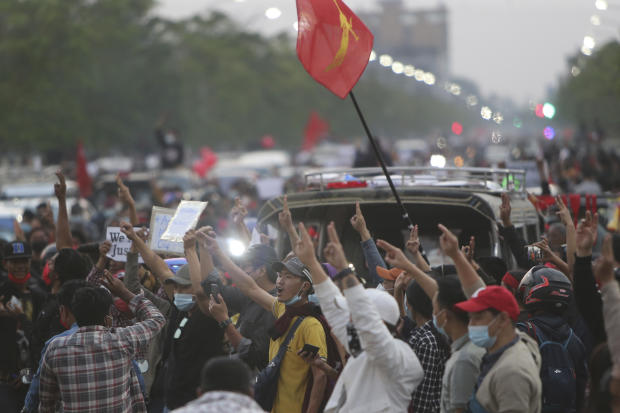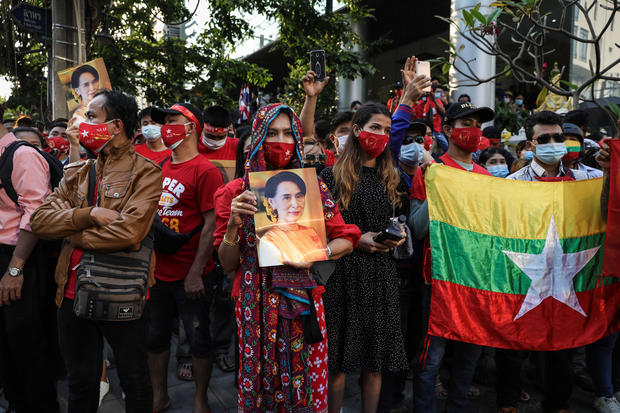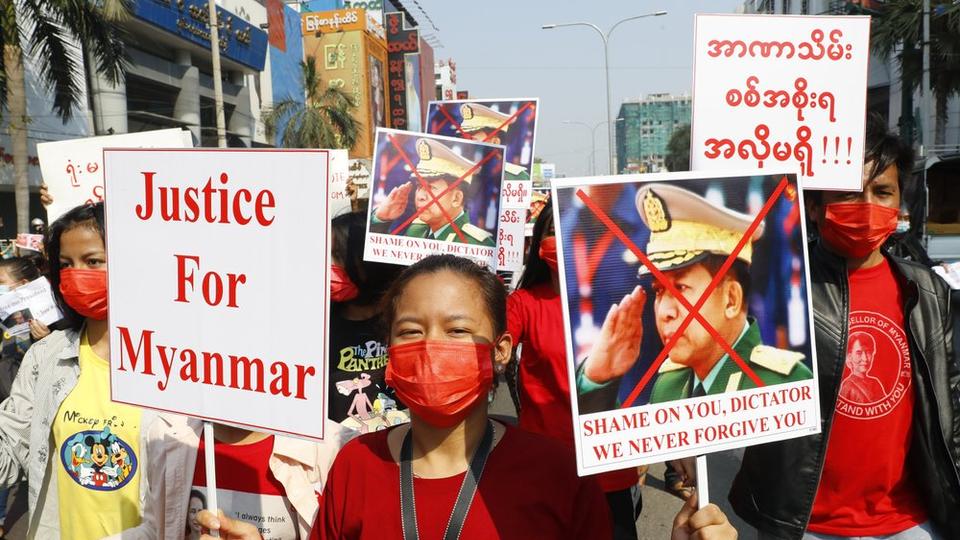Myanmar coup leaders threaten "action" to quell mounting protests
FEBRUARY 8, 2021 / 10:01 AM / AFP
Yangon — Martial law was declared in parts of Myanmar's second largest city Mandalay Monday, after hundreds of thousands rallied across the country against the coup and the military issued a stern warning against further protests. The orders cover seven townships in Mandalay, banning people from protesting or gathering in groups of more than five, and a curfew will run from 8 pm until 4 am, the general administration department said in a statement.
A similar declaration has been made in a township in Ayeyarwaddy further south and announcements concerning other localities are expected to trickle out tonight.
"This order is applied until further notice," a Mandalay township statement said.
"Some people... are behaving in a worrying way that can harm the safety of public and law enforcement. Such behaviors can affect stability, safety of people, law enforcement, and peaceful existence of villages and could create riots, that's why this order bans gathering, speaking in public, protest by using vehicles, rallies," the statement said.
"Action must be taken"
The junta has so far refrained from using deadly force against the demonstrations sweeping most of the country, but with pressure building riot police fired water cannon in an attempt to disperse thousands gathered in Naypyidaw, and there were threats of greater force.
The military last week detained elected leader Aung San Suu Kyi and dozens of other members of her National League for Democracy party, ending a decade of partial civilian rule and triggering international condemnation.
In the face of an increasingly bold wave of defiance, state broadcaster MRTV warned that opposition to the junta was unlawful and signaled a potential crackdown.
"Action must be taken according to the law with effective steps against offenses which disturb, prevent and destroy the state's stability, public safety and the rule of law," said a statement read by an announcer on the channel.
Three-finger defiance
Tens of thousands of people overcame a nationwide internet blockade to rally over the weekend in the first major outpourings of opposition to the coup.
The movement built on Monday, with thousands of protesters holding three fingers into the sky — a defiant gesture borrowed from The Hunger Games movie series — gathering across the country and the start of a nationwide strike. In Yangon, the nation's commercial capital, crowds spilled onto the city's main roads, immobilizing traffic and dwarfing the previous day's rally. Protesters flash the three-fingered salute, a protest gesture borrowed from the Hunger Games movies, as they march against the military rule of their country in Mandalay, Myanmar, February 8, 2021.AP
Protesters flash the three-fingered salute, a protest gesture borrowed from the Hunger Games movies, as they march against the military rule of their country in Mandalay, Myanmar, February 8, 2021.AP
"Down with military dictatorship" and "release Daw Aung San Suu Kyi and arrested people," protesters chanted, flashing the three-finger salute as car horns were honked in support.
Calls for a nationwide strike gathered momentum over the weekend, with textile workers, civil servants and railway employees walking out of work in the commercial hub.
"This is a work day, but we aren't going to work even if our salary will be cut," one protester, 28-year-old garment factory worker Hnin Thazin, told AFP.
Construction worker Chit Min, 18, joined the Yangon rally, saying his loyalty to Suu Kyi outweighed concerns about his financial situation.
"I am jobless now for a week because of the military coup, and I am worried for my survival," he told AFP.
Similarly large crowds marched in Mandalay, the country's second-largest city, many clutching photos of Suu Kyi and waving the red flags of her party.
People hold up images of Myanmar's de-facto leader Aung San Suu Kyi at a protest outside Maynmar's embassy in Bangkok, Thailand, February 1, 2021.LAUREN DECICCA/GETTY
Police attempted to disperse thousands of people gathered on a highway in Naypyidaw, where the deposed leader is believed to be detained. Water cannon were fired into the crowd, injuring at least two demonstrators, according to a photographer on the scene.
Police reportedly put a sign in a roadway warning that security forces could use live ammunition if protesters got past the third of three lines of officers in the city Naypyitaw.
Huge rallies were reported across much of the country, from Muse on the Chinese border to the southern cities of Dawei and Hpa-an. Protesters started to disperse in the early evening.
International pressure post-coup
Myanmar's generals detained Suu Kyi, 75, and other top NLD leaders in pre-dawn raids last Monday, justifying the coup by claiming fraud in last November's elections, which the party won in a landslide.
The junta proclaimed a one-year state of emergency, promising to hold fresh elections after that without offering any precise timeframe.
U.S. President Joe Biden has led global calls for the generals to relinquish power.
Pope Francis on Monday called for the prompt release of imprisoned political leaders.
"The path to democracy undertaken in recent years was brusquely interrupted by last week's coup d'etat," he told a gathering of diplomats. "This has led to the imprisonment of different political leaders, who I hope will be promptly released as a sign of encouragement for a sincere dialogue."
South East Asian lawmakers have also urged Myanmar's military to respect the people's rights to protest.
"As peaceful demonstrations grow, the risk of violence is real. We all know what the Myanmar army is capable of: mass atrocities, killing of civilians, enforced disappearances, torture, and arbitrary arrests, among others," Tom Villarin from ASEAN Parliamentarians for Human Rights said.
First published on February 8, 2021
© 2021 AFP. All Rights Reserved.
















 Protesters flash the three-fingered salute, a protest gesture borrowed from the Hunger Games movies, as they march against the military rule of their country in Mandalay, Myanmar, February 8, 2021.AP
Protesters flash the three-fingered salute, a protest gesture borrowed from the Hunger Games movies, as they march against the military rule of their country in Mandalay, Myanmar, February 8, 2021.AP
